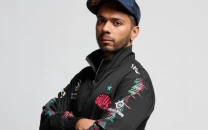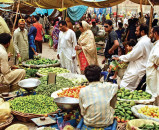Bringing down the house
Junaid Mumtaz undertook the task of playing and promoting Electronic Dance Music amidst friends in...

One of these was Junaid Mumtaz, who undertook with missionary zeal the task of playing and promoting Electronic Dance Music (EDM) amidst friends at gatherings in his native Karachi.
Mumtaz remembers the first time he watched Danny Tenagalia and Junior Vasquez perform at Limelight, a club in New York in 1991 in his freshman year of college. “It was a mix of acid and house and I instantly felt the need to get engaged and somehow take it forward” he remembers. But returning to Pakistan in the mid-nineties was a letdown. Unlike New York’s vibrant club culture, Mumtaz was dismayed that, despite his four years abroad, nothing much had changed in Karachi’s music scene. There were no clubs or parties and Julliana’s, at what was then the Holiday Inn in Karachi, (now the Marriot) was the only club that had DJs play a few nights. Still, none were mixing any music. By 1996, Mumtaz got his own radio show and built on its success. He introduced live trance and mixes, availing every opportunity to play before gatherings that showed even the slightest interest in his music.
“To a certain extent, it worked. It could have flourished even more had the media been supportive,” he says. “I arranged parties and felt a responsibility to instill some desire in the younger generation to listen and acknowledge EDM, as it is soulful, rhythmic and relaxing. It worked to a certain extent but the media, unable to stomach the trend, conflated EDM with drug culture.”
Now living in Lahore, DJ Fuzzy, who is originally from Karachi, realises the complexity of the challenges his musical predecessors had to face in promoting EDM. Mumtaz introduced people to the trance music of Oakenfold, Paul Van Dyke and Tiesto but it was Faisal Baig who took it forward by introducing progressive and tribal house. He played for three years but was disheartened by the lack of support and response from the audience. The taboo of ecstasy and other drugs linked to EDM also made it hard to promote in the mainstream.Mumtaz was also enthusiastic in his efforts to promote trance and its various ‘progressive forms’ — still, it was largely rejected by the local audience.
But between 2004 and 2008, the popularity of EDM DJs rose in Karachi and Lahore. Not only did they start getting invitations to ticketed events, but new DJs playing trance also surfaced and — finally — the audience grew more appreciative of the genre. In the past three years, three internationally famous DJs — Asad Rizvi, Anthony Pappa and Jimmy Van M — have flown to Pakistan to play at events in Karachi. The audience they pulled in Pakistan might have been smaller than in other countries, but this marks some progress.
“Until DJs compose and sell original soundtracks accepted and appreciated by the mass audience, EDM is unlikely to attain the popularity of other genres such as hip hop, jazz and classical,” says Danny*, a former DJ. According to him, the DJ crowd that has sprung up over the last few years, will continue to entertain only small audiences, comprising friends, relatives and a handful of home-returned expats who’ve already developed a taste for trance since, despite a small rise in trance fans, bhangra lovers still dominate parties. Most people in attendance continue to request Indian and Punjabi mixes.
Due to P2P and easy access to data and internet, mixing and composing EDM has also become more accessible in recent years. “This isn’t a good thing as more childish and bland mixes are flooding the internet now,” complains Danny*. Earlier, a DJ could not function without two vinyl turntables, a mixer and a record collection. Buying new records only allowed a few, genuinely interested people to take it up as an occupation.
There are other factors hampering the progress of EDM. One concern is that DJs don’t play real instruments. This is somewhat similar to the allegation against electric guitarists, who are disregarded by classic, finger-style guitarists as ‘lesser’ musicians.
Still, Fuzzy, who sought encouragement from friends and family, to take up DJ-ing professionally in 2007, believes that more people are enjoying house and related music. “Unlike before, they now treat it as an independent music genre, just like hip hop or jazz.”
A consultant by profession, DJ P.O.P.E. picked up DJ-ing as a fun pastime two years ago, agrees with Fuzzy: “There is so much energy is coming in the future.”
In a country where the party culture is tiny at best, and where even mainstream music struggles to come up with commercially viable propositions, the future of progressive music depends pretty much on the passion of these DJs. a
*Name changed to protect privacy.
Junaid Mumtaz, 39, London
Biggest party: All the big parties in Pakistan.
What inspired you to become a DJ? I went to a club called Limelight in ‘91 in New York. Danny Tenagalia and Junior Vasquez were DJing and the music was very house and bits of acid house. I knew I wanted to get involved and take it forward .
Biggest party foul: 10 minutes before the set I realised I had forgotten the record box at the hotel — which was an hour away.
DJ Ali Reza, 28, Karachi
Biggest party: In 2006, opening for Junaid Mumtaz at Voodoo nights in Karachi — the most exhilarating stage I’ve played on.
All time favourite tracks: “Familiar feeling (Timo Maas Main Mix)” by Moloko.
Off the turntables :Work at sales and marketing department for Geo TV.
Biggest party foul: Ejecting the wrong turntable twice in a span of 15 minutes; nothing clears a dance floor quicker than no music.
DJ Shah Rukh, 27, Lahore
Biggest party: Dubai Rain Dance, Club Indigo (Mauritius), Ali Zafar’s Birthday Bash, (Lahore).
Moment you knew you wanted to be a DJ: Watched a Tiesto video on TV in 2004. I couldn’t believe that there are parties happening in the world on such massive scale.
All-time favourite track: “Shine on you crazy diamond” by Pink Floyd, Adagio for Strings.
Off the turntables: I’m directing a show called “Moving Heads”. Plus, I’m a professional graphic designer.
Biggest party foul: Telling the DJ what to play.
Published in The Express Tribune, Sunday Magazine, June 12th, 2011.



















COMMENTS
Comments are moderated and generally will be posted if they are on-topic and not abusive.
For more information, please see our Comments FAQ